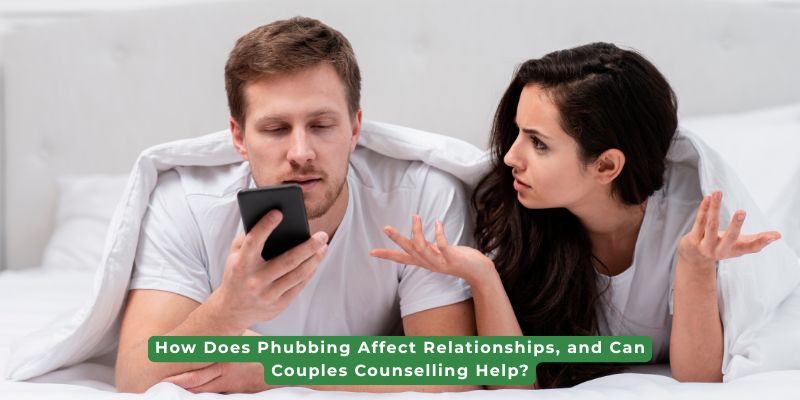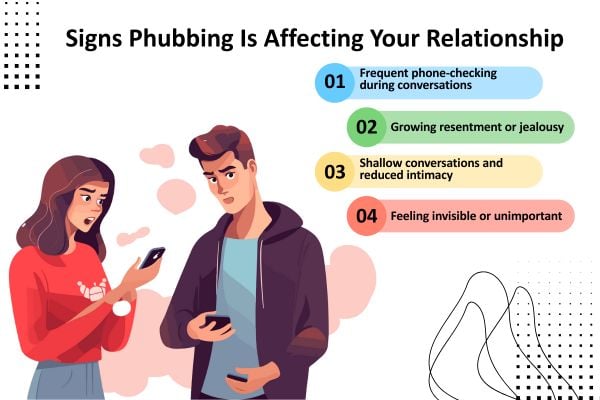We’re more connected than ever, yet often to everything except the person sitting right next to us.
You’ve probably been there. You’re telling your partner about your day, and halfway through—buzz. Their phone lights up. Without even thinking, they glance down. The flow breaks. You pause. And suddenly, what should have been connection feels like rejection.
That little act has a name: phubbing—short for phone snubbing. It’s when someone gives more attention to their phone than to the person right in front of them. In today’s hyper-connected world, phubbing has quietly crept into many relationships, often leaving one partner feeling sidelined, unheard, or even unimportant.
But does it really matter that much? And if it does, how can couples counselling help fix something that looks so small?
Why Phubbing Hurts More Than We Think
At first glance, phubbing might look harmless. “It’s just a quick reply,” your partner might say. But over time, those “quick replies” add up.
Think of it like this:
- Every time your partner looks at their phone instead of you, the message received is: “This screen matters more than you right now.”
- Repeated often enough, that message erodes emotional safety.
A study by relationship researchers even found that couples who experienced frequent phubbing reported lower relationship satisfaction and higher conflict. Why? Because attention is love’s currency. When it’s diverted, connection suffers.
And it’s not just romantic relationships — digital distractions can also take a toll on our emotional wellbeing in general. If you’ve ever felt drained or anxious after scrolling online, you might find our guide on How to Calm Negative Feelings Triggered by Social Media helpful. It explores simple, research-backed ways to restore balance and protect your mental space in a hyperconnected world.
Example dialogue many couples relate to:
- Partner A: “I feel like you never listen to me anymore.”
- Partner B (scrolling): “I am listening, just one sec…”
- Partner A: “See? Exactly this.”
It’s not just about the phone. It’s about what the phone represents: distraction, disconnection, and misplaced priorities.
Signs Phubbing Is Affecting Your Relationship
You may not even realise phubbing is the silent guest at your dinner table. Some common signs include:
- Conversations cut short because one person is checking notifications.
- Arguments escalating with phrases like, “You’re always on your phone.”
- Less intimacy, because quality time is interrupted.
- Feelings of invisibility—the partner on the receiving end feels less valued.
Left unchecked, these patterns can spiral into resentment or emotional distance.
How Couples Counselling Can Help
Here’s the good news: phubbing isn’t a death sentence for relationships. It’s a behaviour, and behaviours can change. Couples counselling provides a safe, structured space to address it.
– Naming the Problem Without Blame – In counselling, the first step is learning to talk about phubbing without finger-pointing. Instead of:
- “You’re always on your phone!”
a counsellor may guide you toward: - “I feel unimportant when the phone takes your attention.”
This shift—from accusation to expression—reduces defensiveness and opens the door for change.
– Setting Boundaries Together – Therapists often encourage couples to design “phone-free zones” (like the bedroom or dining table) or “phone-free times” (like the first hour after work). These small agreements build trust and reclaim shared presence.
– Rebuilding Connection Through Attention – Techniques like the Gottman Method—a research-based approach to couples therapy—focus on micro-moments of connection. For example, noticing when your partner says, “Look at this sunset,” and choosing to engage rather than swipe. Over time, these little shifts rebuild intimacy.
Everyday Tools You Can Start Now
Even before booking a session, here are simple ways to reduce phubbing:
- Silent Mode at Meals: Make dinner a no-scroll zone.
- Eye Contact Rule: If your partner is talking, keep phones down and eyes up.
- Check-In Ritual: Ask, “How’s your day?” before opening emails or social apps.
- Tech Basket: Drop phones in one place during quality time together.
It may sound small, but attention is powerful. Choosing your partner over your phone communicates, “You matter most.”
When to Consider Counselling
If phubbing has become a frequent trigger for fights, or if either partner feels persistently neglected, that’s a signal counselling could help. Sometimes the phone isn’t the real issue—it’s a symbol of deeper struggles: stress, avoidance, or unspoken needs.
A counsellor helps peel back those layers. What feels like a battle about screen time may actually be about longing for connection.
Final Thought
Phubbing isn’t about demonising phones. Technology connects us to work, friends, and even family abroad. The problem begins when it disconnects us from the person right beside us.
The question to ask isn’t, “Do I check my phone too much?”
It’s, “Am I showing my partner that they come first?”
And if the answer feels shaky, couples counselling is a space where both partners can learn to put the phones down, look up, and choose each other again.
References
-
Roberts, J. A., & David, M. E. (2016). My life has become a major distraction from my cell phone: Partner phubbing and relationship satisfaction among romantic partners. Computers in Human Behavior, 54, 134–141.
-
The Gottman Institute. The Gottman Method: Building Stronger Relationships.
-
McDaniel, B. T., & Coyne, S. M. (2016). Technoference in couple relationships. Psychology of Popular Media Culture, 5(1), 85–98.










